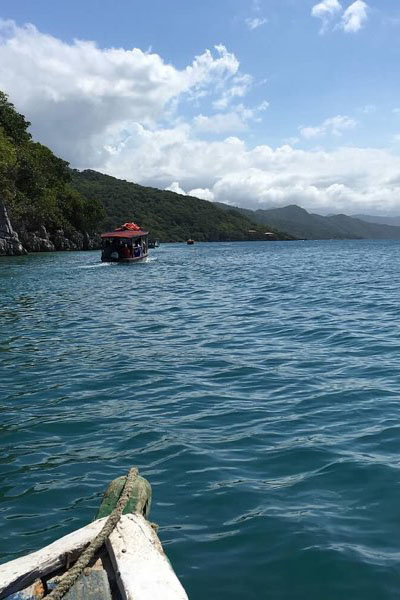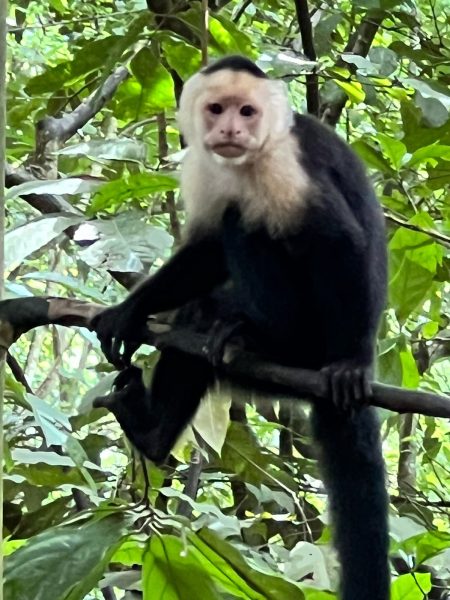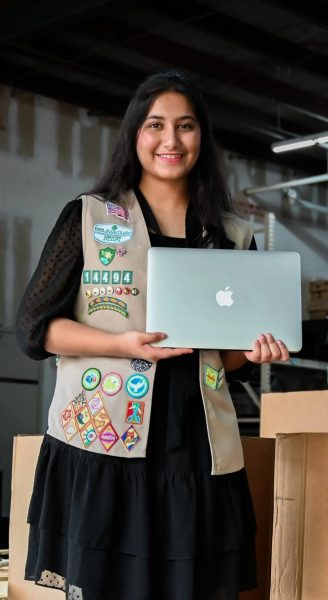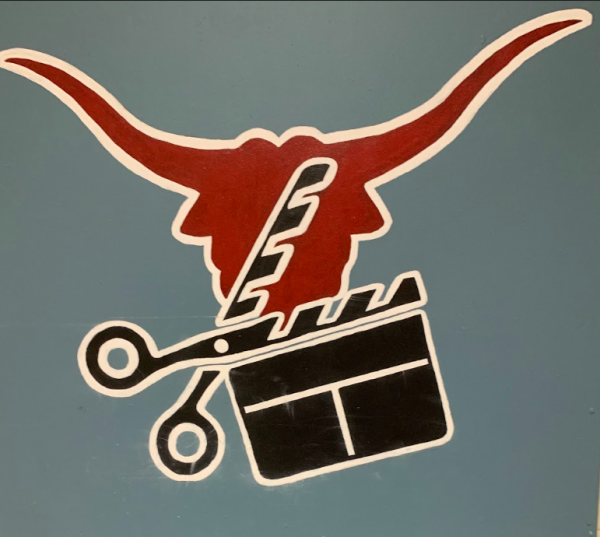Under the Haitian sky

Photo used with permission by Kulee Kim
A boat (bottom left) follows another tourist boat as they pass looming mountains on their way to a secluded beach in Haiti.
“We’re going to the beach in that?” I asked in horror as I stared, wide-eyed, at the decaying, rusty school bus. I wasn’t expecting a pristine bus in Haiti, of all places, but I didn’t feel safe riding on a vehicle that looked as if it’d fall apart at any moment.
The interior of the bus wasn’t any better than the exterior; in fact, it was in worse condition, which I didn’t think was possible. The cover of the seats were ripped and the stuffing was falling out of the seams. Following my friend into a seat, I gingerly sat down, afraid of breaking it.
Once everyone was settled, we departed from our base. As we joined the traffic on the main road, my excitement mounted, but that excitement morphed into shock when we rode parallel to the dirtiest beach I had ever seen. The water was gorgeously blue, but it was hard to appreciate the natural beauty when the shore was covered with trash. There didn’t seem to be an inch of sand without litter. Even though I knew Haiti had a huge issue with littering (every street we had previously visited had been lined with garbage), seeing a beach filled with more trash than sand was appalling.
“Is this the beach we’re going to?” we all wondered. To our relief, we were told that no, this wasn’t it, but to get to our beach, it would take an hour and we would have to go through the city and then the mountains. I mentally groaned; the thought of an hour in this bus was not inviting, but I was already on it, so I might as well bear it.
Less than five minutes and a turn later, we were in the city of Cap-Haitien, to my pleasant surprise. Since our base was located in a rural neighborhood on a street branching off the main road and we had no reason to go into the city, this was our first time in Cap-Haitien, and I was thrilled to see the “city life”. The crowded, narrow streets forced us to navigate through the city slowly, so I had the opportunity to really examine my surroundings.
Instead of the semi-built, part-concrete, part-stick huts we were accustomed to seeing around the base, there were actual colorful, brick buildings. I imagined how they must have looked like when they were newly built: no dirt in every crevice, no chipping paint, standing proudly side by side. After years of being battered by the elements and weathered by time, they had an air of weariness, just like everything else we’ve seen in Haiti.
Even the people looked tired. A few Haitians leaned against door frames, squinting up at our bus as we passed, slightly curious but mostly indifferent about the strange Asian faces that stared back at them. Occasionally, I would see a couple of entrepreneurs attempting to sell their products from their makeshift stands on the sidewalks, sadly without much success.
As the bus weaved through the city streets, we caught glimpses of the nearby mountains behind the low rise buildings. We excitedly pointed out the plethora of houses that dotted the mountainsides, a sight nearly impossible to find in America. The mountains seemed to grow bigger as we drew closer to them and left the city behind. Before long, we were on the rocky path up a mountain.
My fears partially came true. Though the bumpy road did jerk and bounce us around, it was rather fun, almost like a rollercoaster. My screams were not of fright, but of exhilaration. I briefly worried the bus would fall off the edge into the mountain valley because the road was so narrow, but when nothing happened after a few minutes, my uneasiness dissipated.
As we rounded a corner, there were no trees to our left, allowing us to view a picturesque sight of Cap-Haitien and the ocean below us. We all squealed in delight and snapped photo after photo on our phones.
We continued up the mountain where we saw, to our astonishment, huts firmly planted on the ground and people staring as we went by. The poorly built stick huts and the barely clothed children were not anything we hadn’t seen before, but the fact that they lived so far away from civilization coupled with the dangerous location of their homes managed to surprise us. “I can’t believe people live up here,” was the general murmur that ran through the bus.
We quickly forgot about the impoverished people, however, when we left them behind us. We passed our time singing songs, talking, or, in my case, reading. But when the bus turned a corner and the vast ocean came into view, I had to look up at the gleeful exclamations and gazed out the window where the azure sky met the crystalline blue waters that glittered like thousands of blue crystals. White tipped waves rolled across the ocean’s surface. I didn’t have my phone like the others, but I had a brain to permanently imprint the beautiful image.
The mountain’s descending slope informed us that we must be drawing closer toward the beach- but it wasn’t the beach we were going to. We passed several colorful villas and resorts (with actual gates and driveways!) covered in the shade of palm trees. Though they had the Haitian look of dirt filled crannies and nooks, they were still easily the most impressive buildings we had seen in the entire country.
Soon, they faded behind us, and we were greeted with the sight of machinery and a complex surrounded by barb wired fences, a sharp cry from the tourist attracting villas. To me, the proximity of two drastically different worlds was a bleak reminder that poverty overwhelmed any trace of Haiti’s opulence.
When we stopped, confused questions were thrown into the air before it was announced that we were lost. We collectively groaned but left it up to the adults to decide what our fates would be. Eventually, the adults decided to go to a different beach than planned but getting there would require us to take boats. When they asked us how we felt about that, we quickly assented because we didn’t care how we get there so long as we got to play on a beach.
So, having made up our minds, we turned around and went further down the mountain until we hit a dock. Several wooden, colorful boats sat bobbing on the water. They were elongated, low, and rickety. I wasn’t sure if I trusted my life on it, but it was the only way to get to the beach. I sure wasn’t about to swim all the way there. At least there were life jackets.
After we divided into three groups, we climbed onto the precariously rocking vessels, taking care to duck under the low roof and climb over intercrossing wooden beams to get to the benches. The boat was open to the fresh air, so I could stick my hands and head out the “window” which was really just space between evenly spaced wooden pillars that connected the roof to the boat. And because the boat was so low, I could plunge my hand into the clear, green-blue water if I desired. I pivoted my body around to look out the “window” and wave at my friends in the other groups. I could see their excitement on their faces as clear as the water under us.
When we all got situated, our guide untied our boat and started up the motor, launching us across the ocean. Forest-covered mountains majestically towered over us to our left and far right. I laughed in amazement and, with wide eyes, absorbed as much as I could. We bounced over the waves but slowed down when we reached a small bay. Slightly beyond the sand was a platform with beach chairs, swaying palm trees, tables, and small stores. There were already a handful of tourists, but not enough to feel crowded. Pop music blasted in the small, secluded beach.
When the boats docked, we clambered out quickly, eager to start playing in the water. We rushed down the stone dock until we reached the platform. After quickly tossing our belongings onto the tables, we ran down to the sand and into the seafoam green waves, whooping and shrieking gleefully. The other tourists shot us weird glances, but we ignored them, our euphoria blinding us from judgment.
“Oh my gosh, it’s so clear! I can see my feet!” someone exclaimed.
Smiling, I looked down and saw straight down to my wiggling toes. When I looked up, I saw the others already swimming farther out to a collection of rocks. In the far distance, the endless sky was interrupted by the mountains’ silhouettes. Even the weather was perfect. Although large, fluffy clouds floated lazily through the sky, the sun was shining down cheerfully and hit the water at every angle, creating a shimmery effect. Sighing contentedly, I decided this single moment was worth the bumpy ride.
My smile faded slightly as I recalled the poverty we had to witness on the way here. I mused how amazing Haiti’s bipolar nature was. Just an hour away from the ugliness of a man-made city was the beauty of a natural beach.
“Hannah! Come here!” I was shaken out of my reverie by a friend’s yell.
“Coming!” I shouted back. All previous thoughts flew out of my head as I waded towards my friends through the crystalline waters under the Haitian sky.
Your donation will help support The Lambert Post, Lambert High Schools student-run newspaper! Your contribution will allow us to purchase equipment and cover website hosting costs.









